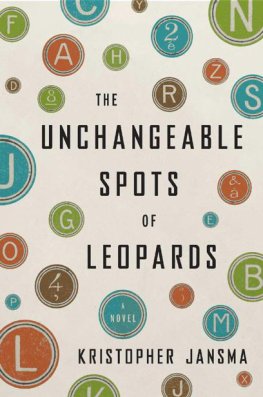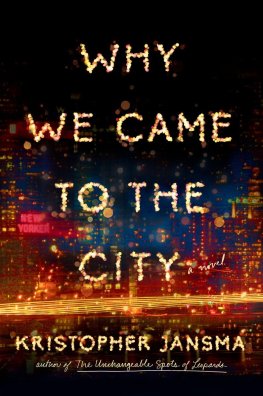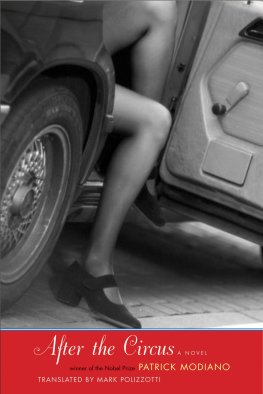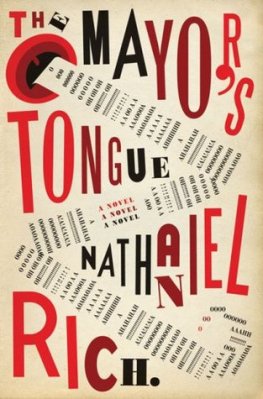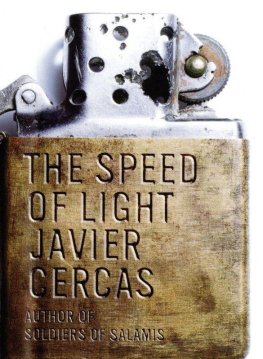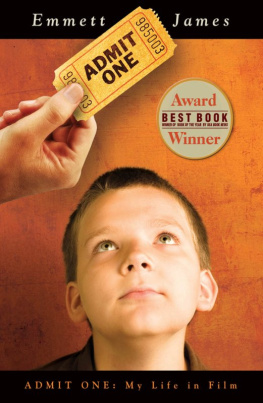Kristopher Jansma
The Unchangeable Spots of Leopards
All good books are alike in that they are truer than if they had really happened. .
ERNEST HEMINGWAY
Truth, like gold, is to be obtained not by its growth, but by washing away from it all that is not gold.
LEO TOLSTOY
If you believe that you are the author of this book, please contact Haslett & Grouse Publishers (New York, New York) at your first convenience.
The truth is beautiful. Without doubt; and so are lies.
RALPH WALDO EMERSON
Ive lost every book Ive ever written. I lost the first one here in Terminal B, where I became a writer, twenty-eight years ago, in the after-school hours and on vacations while I waited for my mother to return from doling out honey-roasted peanuts at eighteen thousand feet.
I used to sit very quietly, at this very table, at Phils Coffee Hub, under the watchful eye of Ms. Barlow, or bellied-up to the Formica countertop of W. W. Goulds Good Eats with Mrs. De Santos, or on a small stool inside the cramped Jewels, Jewels, Jewels! kiosk with Mrs. Nederhoffer. Now these people are all gone and Im as old as they were then.
It was a wonderful time in my life before I became a writer. I had an endless supply of books from Mr. Humnor, the great-girthed man who ran Emerson Books, and I spent many happy hours spying on Mr. Bjorn, who ran Ten-Minute Timepiece Repair.
Mr. Bjorn was the only person in Terminal B who wore a full suit, every day, with a real bow tie. His ancient eyes permanently fixed in a squint the result, I imagined, of studying the tiny gears of wristwatches all day. When he was not seated in his high chair, fixing watches, he stood upright to read the big New York City newspaper. I wanted to be just like him some day.
We first spoke on the day after my eighth birthday. So that I would always know when she would be arriving home again, my mother gave me a gold wristwatch that had been left behind on one of her flights. Its band was twice the diameter of my little wrist, so our first matter of business was to have some links removed by Mr. Bjorn.
When I handed the watch to him, he let loose a fluttery whistle and polished it respectfully to remove the little oily fingerprints Id already gotten all over it.
This is quite a watch for a boy your size, he told me. Whats your name, son?
I did not even dare to speak. My mother smiled her wide smile at Mr. Bjorn and, checking her own watch to see how long she had until her next flight, said, There are no clocks in this place. Have you ever noticed that?
Mr. Bjorns low voice rose sweetly as he spoke to my mother. She had a way of flushing mens cheeks and causing them to stare at the toes of their shoes.
Yes, maam. They dont want passengers getting upset that their flights arent on time. There is a row of ten clocks over in Terminal A. But not one of them is set to Eastern Standard Time.
I listened intently, for I had never set foot in Terminal A. My mother never flew internationally and did not know anyone willing to look after me over there. I had dreamed about Terminal A many times. I imagined it to be just the same as Terminal B, but in reverse a looking-glass terminal, where everyone did everything backward. Or, if it was A, and we were B, perhaps it was the original and we were the copy. Perhaps I was only a reverse version of some other boy whose life was the other way around.
My mother chided Mr. Bjorn for calling her maam as he slipped the newly shortened watchband around my wrist. Then he handed me the removed links in a little plastic bag. You save these, son. Take care of a watch like this and itll last longer than me or even you.
My reflection was small in its gleaming curves. OK, I said.
After that, once every week or so, I would return to Mr. Bjorns shop, and if he was not too busy, he would open the watch for me and inspect the tiny gears inside.
This is the tourbillion, and thats the hairspring back there. And this over here is called the escapement. He gestured to a little anchor-shaped arm that swung like a pendulum, clicking as a tiny-toothed wheel turned beneath it. Thats what makes that ticking sound you hear. The little gear struggled against the anchor. After a second it built up enough force to turn one click, swinging the pendulum, and then it stopped again. Struggled, turned, and stopped.
Each time it goes around a little bit, a second goes away.
Where? I asked, as the pendulum swung again. And again.
He winked at me. It escapes. Thats why they call it that. Escapement.
I barely blinked as it swung and swung again. I think I believed that if I watched closely enough, I could figure out where the seconds were headed.
Sometimes I just sat and listened to the watch ticking. Each tick was another second less before my mother returned. Each tick was another second older that I grew. Each tick was another word that I scribbled into the many notebooks that Mr. Humnor gave me.
I wasnt a writer not yet, of course but I wrote. From the days before my feet could touch the linoleum floor beneath my seat, I had been jotting little things down about the odd parade that flowed through Terminal B: pilots, passengers, and the people waiting to greet them. I began doing this so that I could tell my mother about all the things shed missed while shed been gone. Every day I saw so many new people, rushing through the terminal to one place or another while I remained still. For all my hours spent in Terminal B, Id never flown on an airplane not once. I wondered where all the people kept escaping to, like those little seconds inside my watch. But in between arrivals and departures, I got bored, and sometimes I made people up, to see if my mother could detect the false woman in a pink blazer, with the hamster in her carry-on luggage, among the actual transient citizens of Terminal B.
Not long after receiving the gold watch, I wrote my very first book, a mystery I called The Pink Packet Thieves, twenty-two pages in length, including illustrations. It concerned an unnamed boy detective who is summoned by the Chief of the Airport Police to discover who has been stealing all the pink packets of artificial sweetener from the various restaurants in the terminal. The boy detective cleverly conceals himself in a trash can and lies patiently in wait for the criminal mastermind to appear. All day long, the boy endures the garbage that the travelers are heaping unknowingly onto his head. He is resolute and, indeed, the long wait pays off. By the light of the full moon, the boy detective spots two suspicious figures sneaking around. The boy detective confronts the shadows and discovers they are Xavier and Yvette DArgent, a wealthy brother and sister who are new in town and who confess that they have been stealing the artificial sweeteners to feed a horrible addiction that they developed during their idle youths in Paris. (I had learned a few things from eavesdropping on Mrs. De Santos, talking about her sons.) In the end, the boy detective is moved by their tale and agrees to keep their secret, in exchange for the return of the sweetener, a promise that the thievery will cease, and assurances that both siblings would consult their parents about treatment options. Just as the story appears to come to a wholesome conclusion, however, the boy detective recalls his earlier sufferings in the trash can. Then, on the next page, he is seen telling the Chief of the Airport Police that he has been unable to find the culprits, and he walks away with the stolen sweetener in a black suitcase. A brief epilogue reveals that the boy detective then sells the pink packets on the black market, retires for good, and that the newly cured Xavier and Yvette become his best friends, now that he is as wealthy as them.

